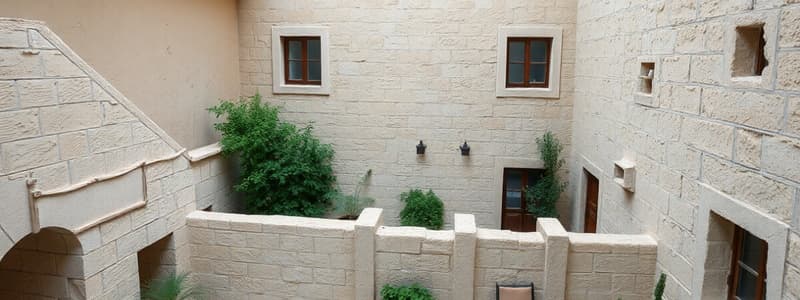Podcast
Questions and Answers
When is one obligated to build a fence in a valley with grain fields?
When is one obligated to build a fence in a valley with grain fields?
- Never
- Always
- Where it's customary (correct)
- Only if both parties agree
If one partner builds a fence in a field on their own, where should they ideally place it?
If one partner builds a fence in a field on their own, where should they ideally place it?
- On their neighbor's side
- On their own side (correct)
- Wherever they choose
- In the middle
What should be done to show ownership if one partner builds a fence on their own?
What should be done to show ownership if one partner builds a fence on their own?
- Make a sign on the outside
- Paint it a specific color
- Register it with local authorities
- No need to show ownership (correct)
How thick should a wall be when built with whole bricks?
How thick should a wall be when built with whole bricks?
What happens if a wall between a vineyard and a grain field falls down?
What happens if a wall between a vineyard and a grain field falls down?
What is the consequence if the vineyard owner abandons the wall and doesn't rebuild it?
What is the consequence if the vineyard owner abandons the wall and doesn't rebuild it?
What does the Gemara say about local custom in building walls?
What does the Gemara say about local custom in building walls?
How does the Gemara prove that 'mechitzah' means a wall?
How does the Gemara prove that 'mechitzah' means a wall?
What does the Mishnah state about the location of a partition in a shared courtyard?
What does the Mishnah state about the location of a partition in a shared courtyard?
How is the thickness of a wall constructed with rough-edged stones specified in the Mishnah?
How is the thickness of a wall constructed with rough-edged stones specified in the Mishnah?
What is the status of a wall and its place if it falls down according to the Mishnah?
What is the status of a wall and its place if it falls down according to the Mishnah?
What interpretation does the Gemara initially give to the term 'mechitzah' in the Mishnah?
What interpretation does the Gemara initially give to the term 'mechitzah' in the Mishnah?
Why does the Mishnah phrase it as 'they build the wall' rather than just 'they must build it'?
Why does the Mishnah phrase it as 'they build the wall' rather than just 'they must build it'?
What is Rabbi Abba's teaching regarding standing near a friend's field?
What is Rabbi Abba's teaching regarding standing near a friend's field?
What is the minimum height required for a wall to be rebuilt if it collapses in a shared courtyard?
What is the minimum height required for a wall to be rebuilt if it collapses in a shared courtyard?
What structures are residents of a courtyard required to help build?
What structures are residents of a courtyard required to help build?
Study Notes
Building Partitions and Fences
- Partners in shared courtyards must build a partition (mechitzah) between their spaces.
- The partition should be positioned in the middle of the shared space.
- When using rough-edged stones, the wall's thickness should be 3 tefachim from each partner's side.
- When the wall falls down, it's owned by both partners.
- The word "mechitzah" can also be interpreted as a fence.
- The Mishnah uses the phrase "they build the wall" to emphasize joint ownership.
Fence Requirements
- A wall must be rebuilt to a height of 3 amos if it collapses in a shared courtyard.
- All residents of a courtyard must contribute to building a gatehouse and a door.
- A courtyard must be at least 4 amos in size for partners to divide it.
- Rav Nachman, in the name of Shmuel, stated that a roof adjoining a neighbor's courtyard needs a 2-ama fence.
- A fence should be built in a vegetable garden where it's customary.
- A fence is required in a valley with grain fields where it's customary.
Building on One's Own Property
- When one partner builds a fence on their own property, they should place it on their own side.
Other Key Points
- Visual trespass, like looking into a neighbor's house or courtyard, generally doesn't constitute substantial damage.
- A wall made with whole bricks should be 2 tefachim thick from each partner's side.
- If a wall between a vineyard and a grain field collapses, the vineyard owner is obligated to rebuild it.
- The gemara attempts to prove that visual trespass isn't substantial damage by examining Rabbinic interpretations.
- A wall built with smooth stones should be 2 tefachim thick from each partner's side.
- The gemara states that local custom in building walls should be followed.
- It is customary for the owner of a vegetable garden to build a fence.
- One can build a wall on their property in a grain field, even if it isn't customary, as long as it's on their own land.
- The word "mechitzah" is proven to mean a wall by examining different sources.
Studying That Suits You
Use AI to generate personalized quizzes and flashcards to suit your learning preferences.
Description
Test your understanding of the laws regarding partitions and fences, or mechitzot, in shared courtyards as discussed in the Mishnah. This quiz covers requirements for building, joint ownership, and specific height and size stipulations. Assess your knowledge about the responsibilities and customs involved in shared spaces and fencing.

